


Are you worried about blood clots and their impact on your heart health? You're not alone. Many people share these concerns, and it's important to know that there are effective treatments available to help you manage this condition.
This article explores ten crucial treatments for blood clots, emphasizing a multifaceted approach that includes:
Lifestyle modifications and patient education also play a vital role in your care. Recent advancements and ongoing clinical trials are enhancing patient outcomes and safety, ensuring that you receive the best possible support in managing blood clot conditions.
In addition to these treatments, consider how lifestyle changes can positively impact your health. Simple adjustments, like incorporating regular exercise and a balanced diet, can make a significant difference. Remember, you are not alone in this journey; support is available to help you navigate these changes.
Furthermore, educating yourself about your condition can empower you to take charge of your health. Don't hesitate to reach out to healthcare professionals who can provide guidance tailored to your needs.
Ultimately, your health and well-being are paramount. By understanding the options available and seeking support, you can take proactive steps towards a healthier future. Remember, it's okay to ask for help, and there are people who care about your journey.
Facing the reality of blood clots can feel overwhelming, especially when you think about how they might affect your heart health. But there’s good news! Thanks to advancements in medical technology and treatment options, there are many effective therapies available that can help you recover and improve your health outcomes.
You might be wondering, how do you navigate this complex landscape of treatments to find what works best for you? This article explores ten innovative and effective treatments for blood clots, offering insights that empower you to take charge of your vascular health. Remember, you’re not alone in this journey, and there are solutions out there tailored to your needs.
At Amavita Heart and Vascular Health, we understand that facing vascular blockages can be daunting. That’s why we offer a wide range of sophisticated therapies tailored to meet your unique needs. Under the compassionate leadership of Dr. Pedro Martinez-Clark, our team employs state-of-the-art techniques for the treatment for blood clots in heart conditions such as deep vein thrombosis (DVT) and pulmonary embolism (PE).
We believe in a patient-centered approach that combines medical excellence with heartfelt support. Our commitment to continuous care throughout your treatment journey ensures that you never feel alone. We’re particularly proud of our efforts to reduce non-traumatic lower extremity amputations, reflecting our dedication to enhancing your cardiovascular health outcomes.
Recent advancements in managing coagulation, including FDA-approved thrombectomy systems, have significantly improved recovery rates and reduced complications, providing a better treatment for blood clots in heart. This progress not only reinforces our status as a leader in the field but also highlights our unwavering commitment to your well-being.
If you have concerns about your vascular health, we invite you to reach out. Together, we can navigate your treatment options and work towards a healthier future.
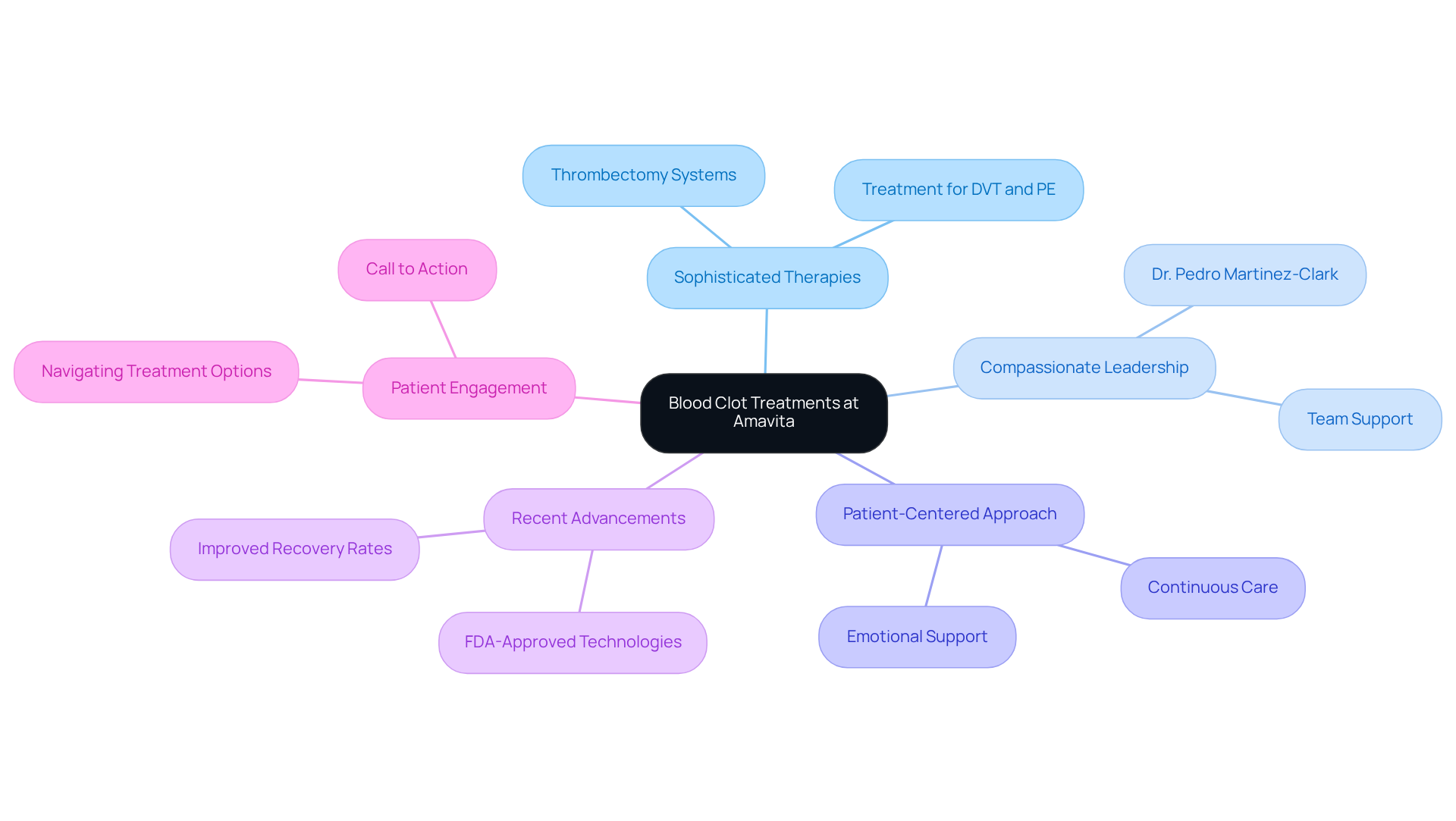
Anticoagulants, often known as blood thinners, serve as a crucial treatment for blood clots in heart and help manage circulatory issues. They work by reducing the blood's ability to clot, which helps prevent existing clots from growing and lowers the risk of new clots forming. Common options like warfarin, rivaroxaban, and apixaban serve as a treatment for blood clots in heart conditions, particularly for those with atrial fibrillation or individuals recovering from certain surgeries. It's crucial to monitor these medications regularly and adjust dosages as needed to ensure they work effectively while minimizing the risk of bleeding complications.
Have you heard about the recent studies showing the benefits of direct oral anticoagulants (DOACs)? These findings are encouraging, especially for older adults with atrial fibrillation. The use of DOACs has increased significantly, with initiation rates jumping from just 1.1% in 2010 to an impressive 30.9% in 2020. This shift highlights a growing awareness of their safety advantages over traditional treatments like warfarin, which has seen a decline in use from 55% to only 2% among eligible patients.
It's also important to start the treatment for blood clots in heart promptly. Did you know that beginning treatment for blood clots in heart with blood thinners within four days of an ischemic stroke can reduce the risk of another stroke by nearly one-third? This emphasizes how crucial early intervention is for improving recovery outcomes.
To ensure these medications are as effective as possible while minimizing bleeding risks, regular monitoring and dosage adjustments are essential. The landscape of anticoagulant therapy is evolving, with innovations like smart sensor integration and point-of-care testing on the horizon. These advancements promise to enhance patient compliance and outcomes even further. As the market for anticoagulants is projected to reach $45.65 billion by 2029, the focus on personalized medicine and home-based management will likely shape future treatment approaches.
If you have concerns about anticoagulants or your health, please don’t hesitate to reach out for support. You’re not alone in this journey, and there are resources available to help you navigate your treatment options.

Thrombolytics, commonly known as 'clot busters,' are an essential treatment for blood clots in heart emergencies, aiding in the rapid dissolution of clots that can endanger lives. If you or a loved one has ever faced a heart attack or stroke, you know how vital it is to restore blood flow swiftly. These medications can significantly reduce long-term damage to organs and tissues, offering hope in critical moments.
Notable thrombolytics like alteplase and tenecteplase are administered intravenously, and recent studies show that they can lead to improved outcomes for those experiencing acute myocardial infarction. There are inspiring success stories where timely intervention has not only saved lives but also preserved heart function. For example, research indicates that the use of recombinant human TNK tissue-type plasminogen activator (rhTNK) has shown superior efficacy and a lower risk of bleeding compared to traditional agents like Urokinase and alteplase.
While it's encouraging to see that thrombolytic therapy rates for stroke patients are rising, it's concerning that many still do not receive this life-saving treatment. Cardiologists stress the importance of these medications in emergency settings, highlighting how their timely administration can drastically change the course of treatment for blood clots in heart and recovery. However, it's essential to remember that the use of thrombolytics is closely monitored due to potential side effects, particularly bleeding. This underscores the need for careful selection of individuals and monitoring during treatment.
If you have questions or concerns about thrombolytics, don’t hesitate to reach out for support. Understanding your options can empower you to make informed decisions about your health.
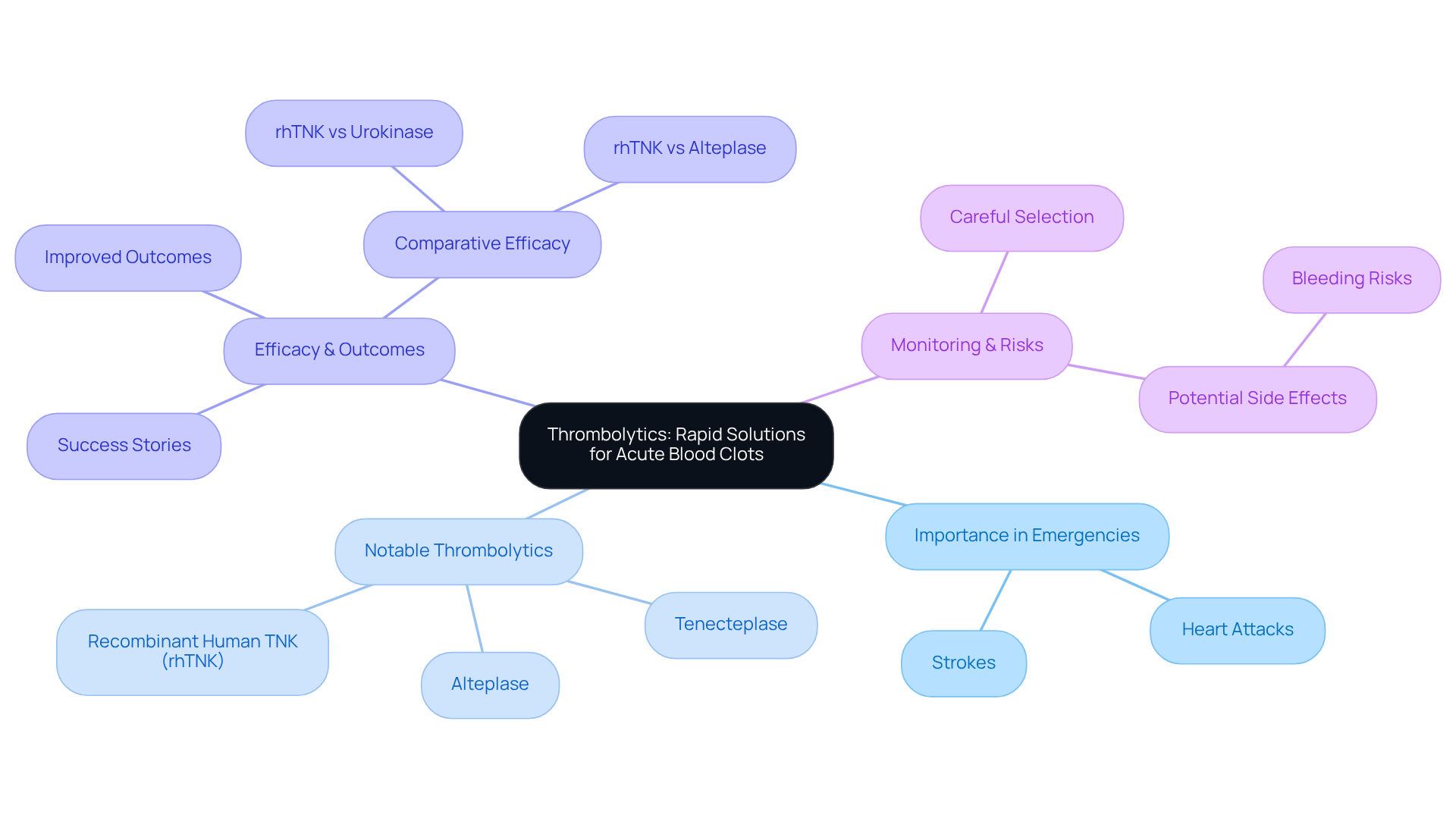
Mechanical thrombectomy is a gentle yet advanced technique designed to help remove blood clots from vessels. This method is especially beneficial for those facing acute pulmonary embolism or serious symptoms from deep vein thrombosis (DVT). At Amavita Heart and Vascular Health®, we use state-of-the-art imaging technology to guide catheters precisely to the clot's location. This allows us to remove the clot physically and restore blood flow without the need for major surgery. Patients often find that they can return to their normal activities within just 3 to 5 days, a significant improvement compared to the weeks it typically takes with traditional surgical methods.
But the advantages of mechanical thrombectomy go beyond just a quicker recovery. It also comes with a lower risk of complications. Our vascular surgeons have noted that this technique not only enhances comfort for patients but also leads to better overall health outcomes. Dr. Rachel Rosovsky, a co-global principal investigator of the STORM-PE trial, shared, "What’s particularly compelling is that a significantly greater portion of individuals treated with CAVT achieved normalization of RV/LV ratio within 48 hours — a critical indicator of right heart recovery — without an increase in complications." This statement underscores how effective this procedure can be in promoting a swift recovery.
As we look to the future, advancements in minimally invasive thrombectomy techniques are continually evolving. Ongoing research and clinical trials are expanding its applications, ensuring that more patients can benefit from these life-saving procedures. The medical community is embracing these innovations, and the philosophy of 'No Stroke Left Behind' highlights the importance of timely interventions for patients with recoverable tissue. At Amavita, we believe in integrating mechanical thrombectomy as a standard treatment for blood clots in heart, which reinforces its vital role in modern vascular care.
If you or a loved one are facing concerns about vascular health, know that we are here to support you every step of the way. Your health and comfort are our top priorities.
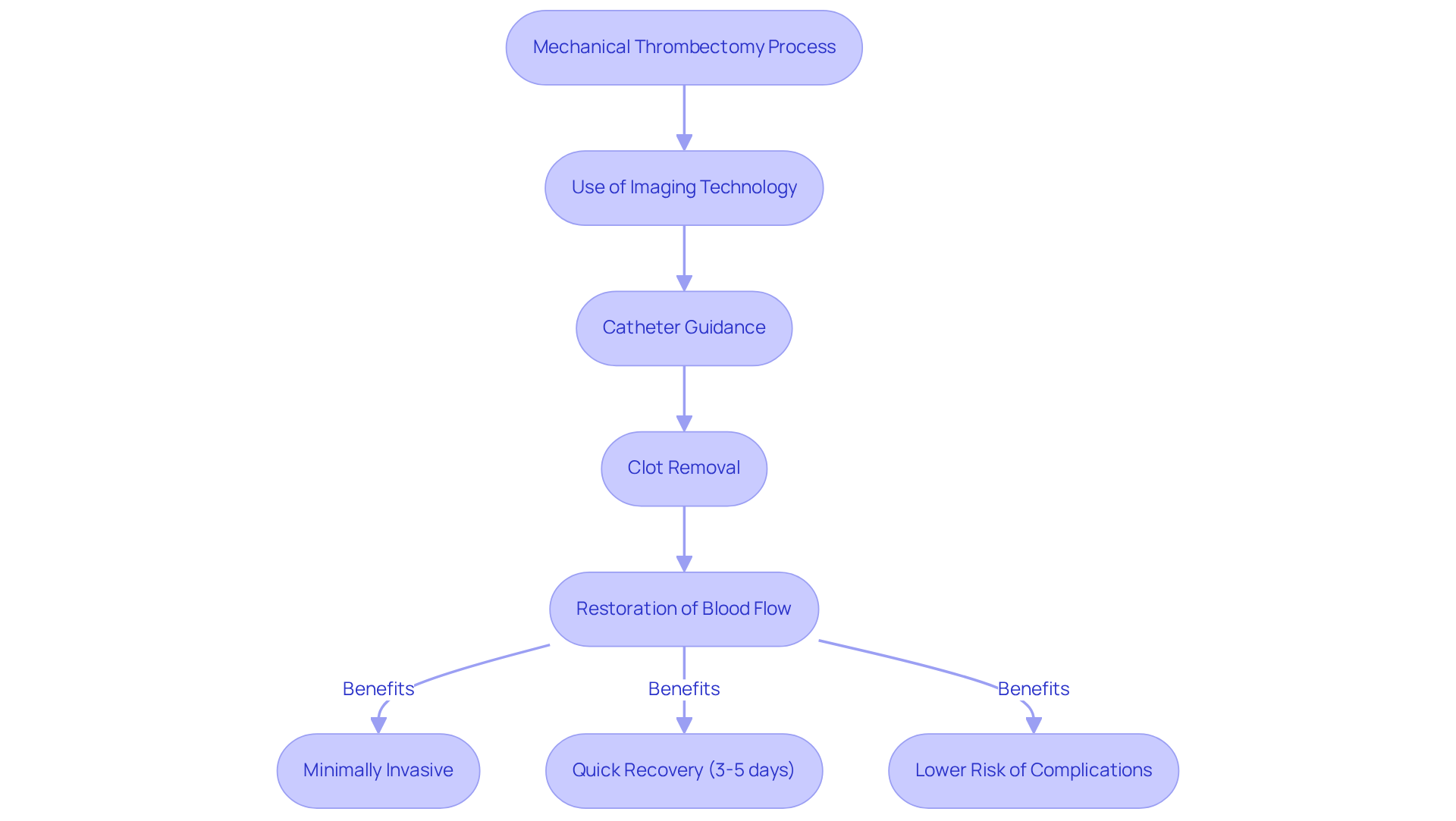
Compression stockings are specially designed garments that gently apply regulated pressure to the legs, significantly enhancing circulation and lowering the risk of thrombosis. They are particularly beneficial for individuals who may be at higher risk, such as those with a history of deep vein thrombosis (DVT) or those who find themselves sitting or standing for long periods. By preventing blood from pooling in the veins, these stockings help reduce swelling and discomfort, making them an essential treatment for blood clots in the heart.
Have you ever wondered how compression therapy can make a difference? Real-world applications have shown encouraging results. For instance, research indicates that graduated compression stockings can decrease the occurrence of postoperative DVT in surgical patients to about 11%. This statistic highlights the effectiveness of compression therapy, especially for elderly patients who might be more vulnerable to complications from prolonged immobility.
Healthcare professionals strongly recommend the use of compression garments as a preventive measure. Dr. Tonnessen notes that "a compression stocking can be particularly helpful for reducing swelling and improving circulation," emphasizing their importance in managing conditions like DVT. Recent guidelines suggest that individuals at risk should wear these stockings regularly, especially during times of limited movement, to enhance circulation and prevent blockages.
In addition to traditional options, alternatives like Tubigrip® can offer support without covering the feet, making them easier to put on for older or less active individuals. It's also vital for anyone considering compression stockings to consult a healthcare professional, particularly those with specific health conditions or who are bedbound, to ensure safe and effective use.
In summary, compression stockings serve as a crucial tool in managing and preventing thrombus, and they are considered an effective treatment for blood clots in the heart, especially for those in at-risk groups. Their ability to improve circulation and alleviate discomfort makes them a recommended choice for anyone looking to maintain their vascular health. Remember, taking care of your health is important, and seeking support is a step in the right direction.
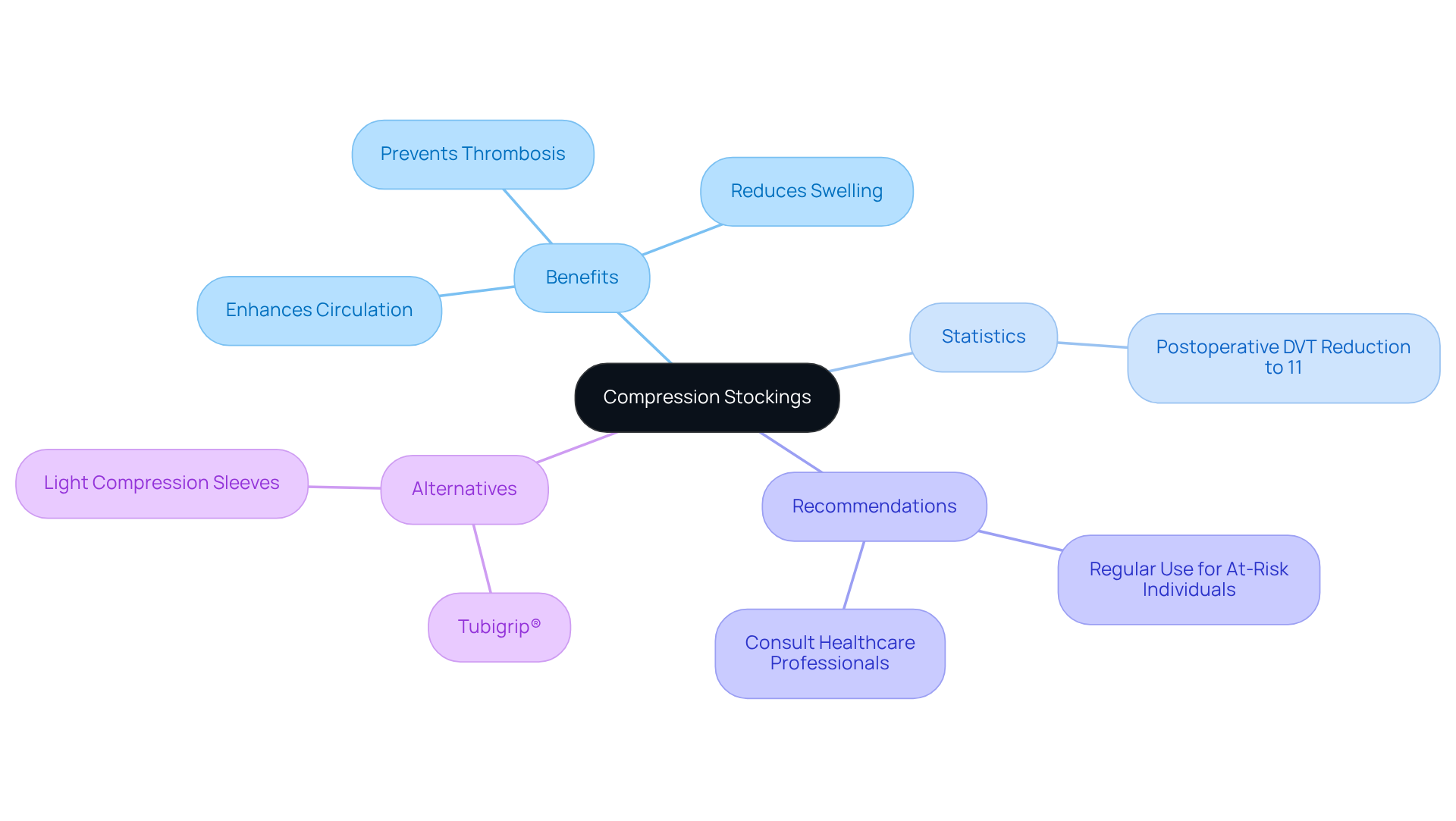
Making changes to your lifestyle is essential for reducing the chances of requiring treatment for blood clots in the heart. Have you considered how simple adjustments can make a big difference? Key strategies include:
Research shows that individuals who follow a balanced diet rich in fruits, vegetables, and whole grains not only improve their overall cardiovascular health but also lower the risk of venous thromboembolism (VTE). For example, a study found that participants with an optimal LS7 score had a lower incidence of VTE (3.9%) compared to those with inadequate LS7 (5.7%).
It's important to remember that quitting smoking and limiting alcohol intake can significantly reduce the risk of blood clots, which is crucial for the treatment for blood clots in the heart. As highlighted by the Tanner Vein Center, stopping smoking can greatly decrease the likelihood of needing treatment for blood clots in the heart, including deep vein thrombosis (DVT). Routine check-ups with healthcare professionals are crucial for monitoring and managing your health effectively. These visits ensure that you stay proactive on your cardiovascular health journey.
Cardiologists emphasize that a combination of good nutrition and physical activity is vital for heart wellness, which is important for the treatment for blood clots in the heart. This reinforces the idea that the choices we make in our daily lives play a crucial role in preventing circulatory blockages. Furthermore, ongoing research highlights the impact of lifestyle changes for individuals at high genetic risk for VTE, underscoring the importance of proactive health management. Remember, you’re not alone in this journey; support is available, and taking these steps can lead to a healthier, happier life.
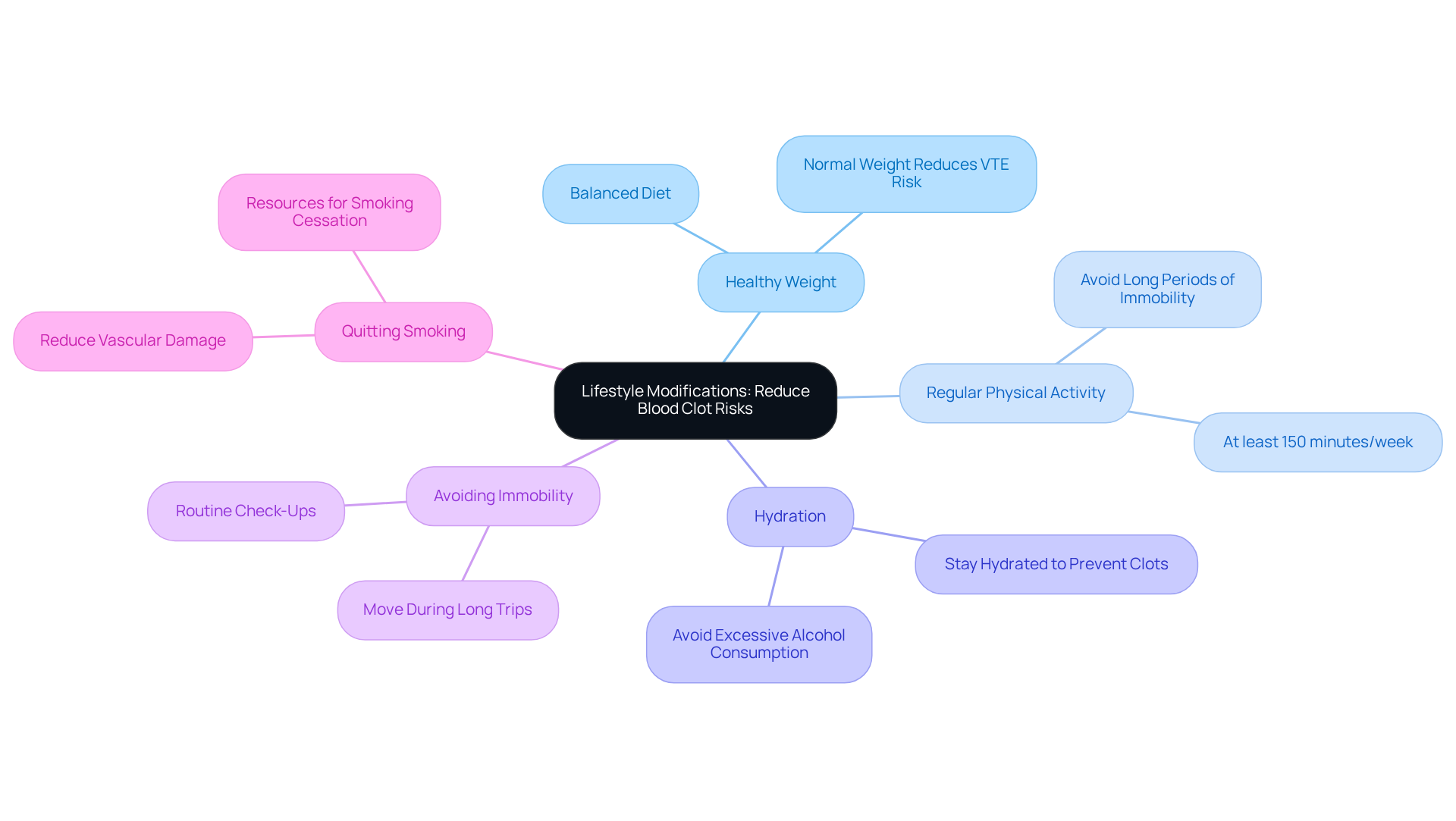
For individuals receiving treatment for blood clots in heart, especially those on anticoagulant therapy, frequent oversight is crucial. Have you ever wondered how your treatment is working? Healthcare providers recommend routine blood tests to evaluate the effectiveness of your medications and to make any necessary dosage adjustments. If you have a history of deep vein thrombosis (DVT) or pulmonary embolism (PE), follow-up appointments become even more essential. These visits help assess your recovery and prevent any recurrence of these conditions.
This proactive approach not only helps detect potential complications early but also significantly enhances your overall safety and health outcomes. Current guidelines emphasize the importance of consistent monitoring, with healthcare professionals advocating for structured follow-up care as a crucial treatment for blood clots in heart. This ensures that you receive the optimal management of your anticoagulant therapy.
Real-world examples show that effective follow-up can lead to improved adherence to treatment and a better quality of life. It’s a reminder of the critical role healthcare providers play in your journey to better health. Remember, you’re not alone in this process; support is always available to help you navigate your care.

Understanding your health is crucial, especially when it comes to conditions like thrombosis. Patient education initiatives play a vital role in helping you grasp your risk factors and the importance of following treatment guidelines. These programs often include:
Have you ever wondered about the signs of vascular blockages? By learning about these indicators and the importance of lifestyle changes, you can take proactive steps towards better health. These initiatives aim to lower the occurrence of thromboembolic incidents, ultimately enhancing your overall health outcomes.
In addition to this, adhering to medication is essential. It’s not just about understanding; it’s about feeling empowered to make choices that benefit your well-being. Remember, you’re not alone in this journey. Your healthcare team is here to support you every step of the way.
If you have any questions or concerns, don’t hesitate to reach out. Together, we can work towards a healthier future.
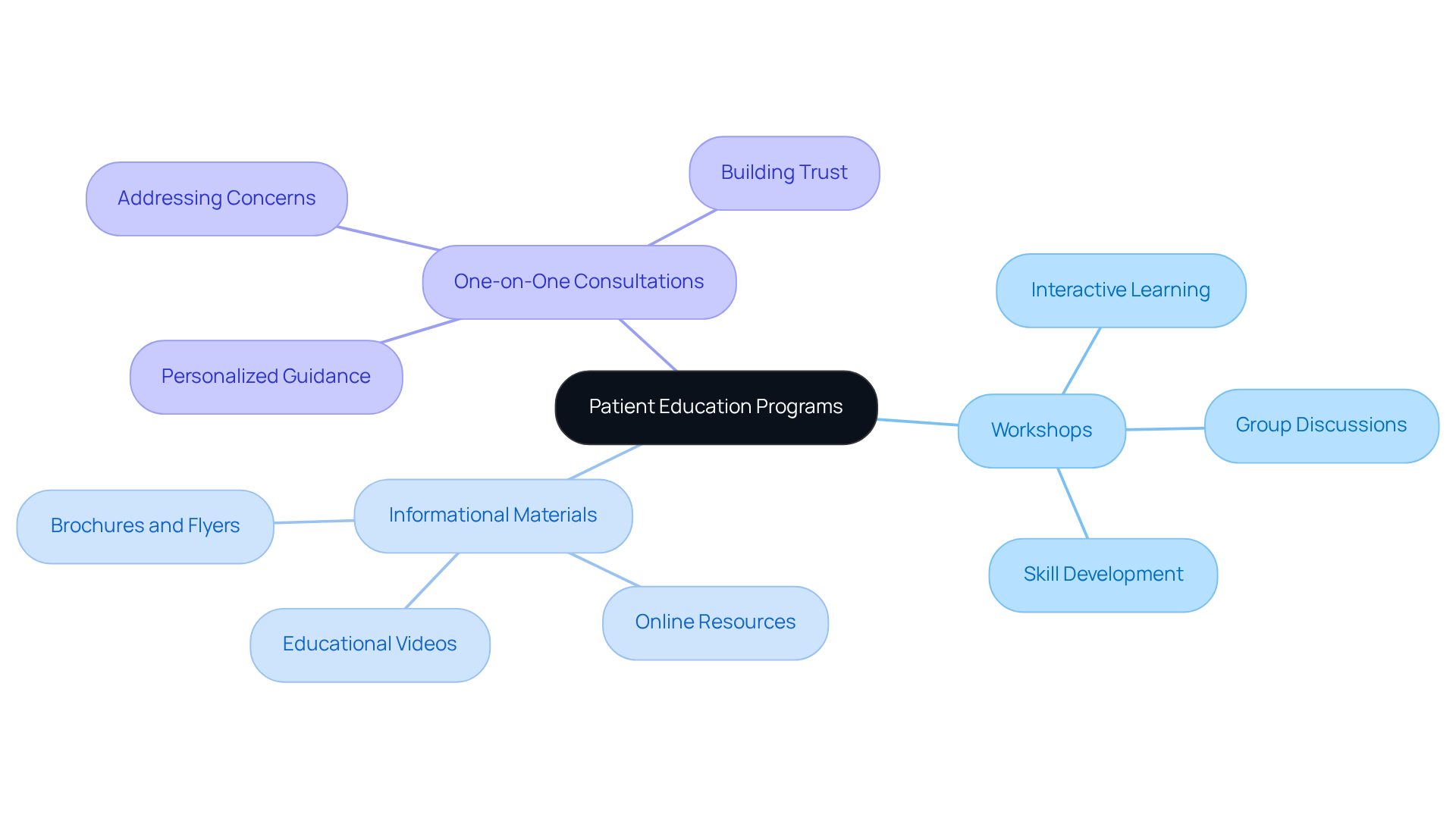
At Amavita Heart and Vascular Health, we understand that concerns about blood clots can be overwhelming. That’s why we’re at the forefront of clinical trials aimed at developing innovative treatment for blood clots in heart. These trials not only provide access to therapies that may not yet be widely available but also contribute to advancing medical knowledge and improving treatment protocols. For example, recent studies have shown significant progress with the 'on-the-table' (OTT) approach, leading to a 24% reduction in the right ventricular to left ventricular diameter ratio and a 29% decrease in pulmonary artery obstruction within just 48 hours of treatment.
Participating in clinical research allows individuals to play a vital role in the evolution of cardiovascular care. By joining us, you’re helping to shape future therapies that could benefit many. Our dedicated research team at Amavita is committed to conducting all trials with the highest ethical standards, ensuring participant safety is always a priority. This commitment to innovation is further highlighted by the ENGULF study, which evaluated the Hēlo Thrombectomy System. This study demonstrated a 0.95% major adverse event rate and a 25.1% reduction in right heart strain, showcasing the promise of new technologies in treating pulmonary embolism.
Through these initiatives, Amavita is not only enhancing treatment options for vascular obstructions but also fostering a supportive environment where patient involvement is valued and essential for advancing treatment for blood clots in heart. We invite you to reach out and learn more about how you can be part of this important journey.
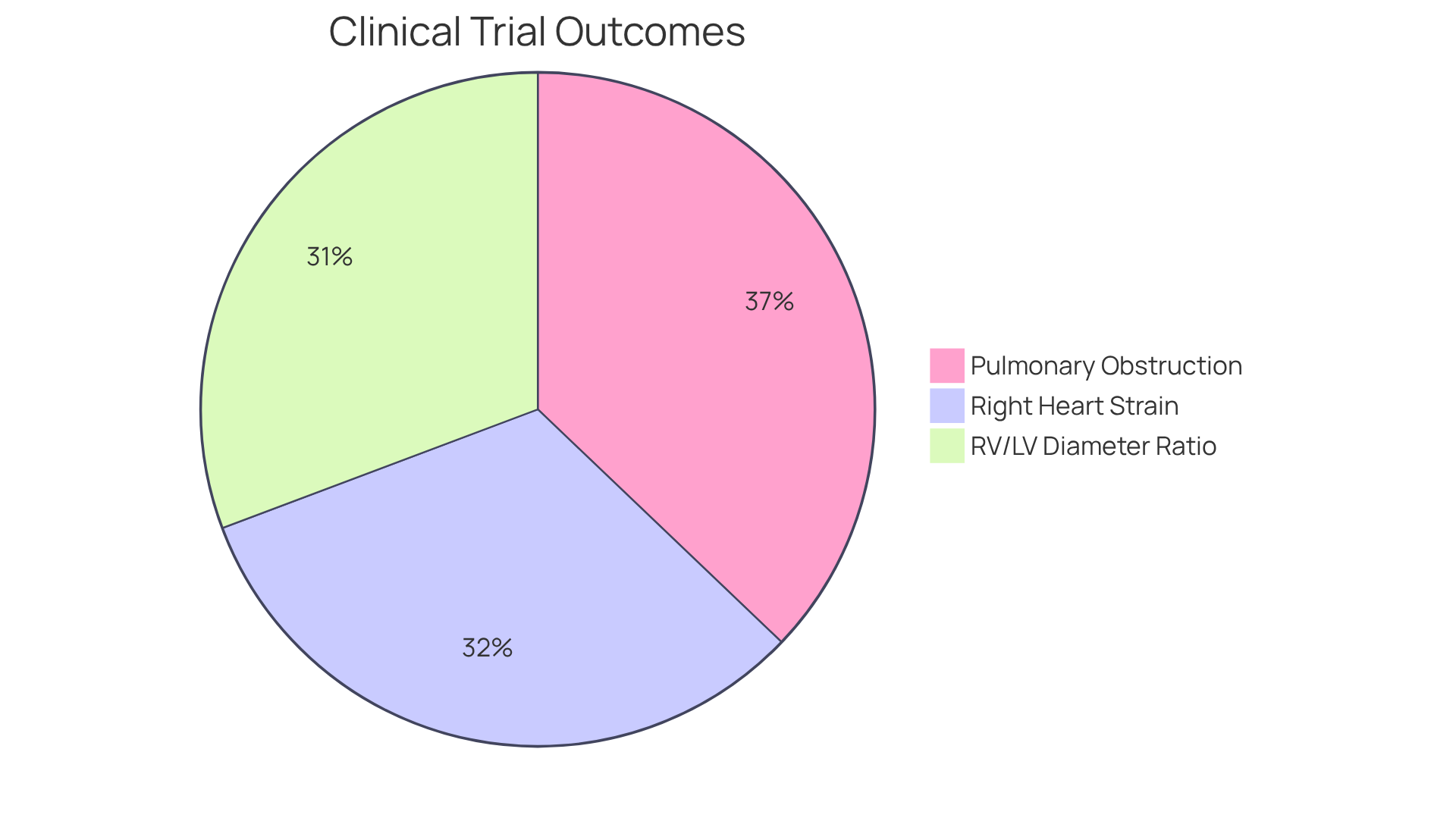
Community outreach initiatives play a crucial role in preventing blockages and enhancing awareness of heart health. At Amavita Heart and Vascular Health, we actively engage in various initiatives, such as health fairs and educational seminars, in partnership with local organizations. These efforts focus on sharing vital information about the dangers of thrombosis and prevention methods, particularly for marginalized communities. By ensuring that everyone has access to essential knowledge and resources, we foster a culture of awareness and prevention, significantly contributing to the well-being of our community.
Have you ever wondered how early detection can change lives? Our recent collaboration with ISAP to introduce AI-powered point-of-care ultrasound technology is a testament to our commitment. This innovation aims to improve early cardiac diagnostics in these communities, enhancing diagnostic accuracy and facilitating quicker treatment plans. By addressing healthcare disparities, we promote better heart health for all.
Amavita offers advanced therapies for coronary artery disease, valve and structural heart conditions, and arrhythmias, which are vital for the treatment for blood clots in heart challenges. With thrombosis being the underlying cause of 1 in 4 deaths worldwide each year, our outreach programs are essential in reducing this risk. The timing of these efforts aligns with World Thrombosis Day's campaign titled 'From Head to Toe, Take Control. Prevent Thrombosis. Protect Your Health,' which emphasizes the importance of awareness and prevention.
We understand that health concerns can be overwhelming, but remember, you’re not alone. Our team is here to support you every step of the way. If you have questions or need assistance, please reach out. Together, we can take control of our heart health.
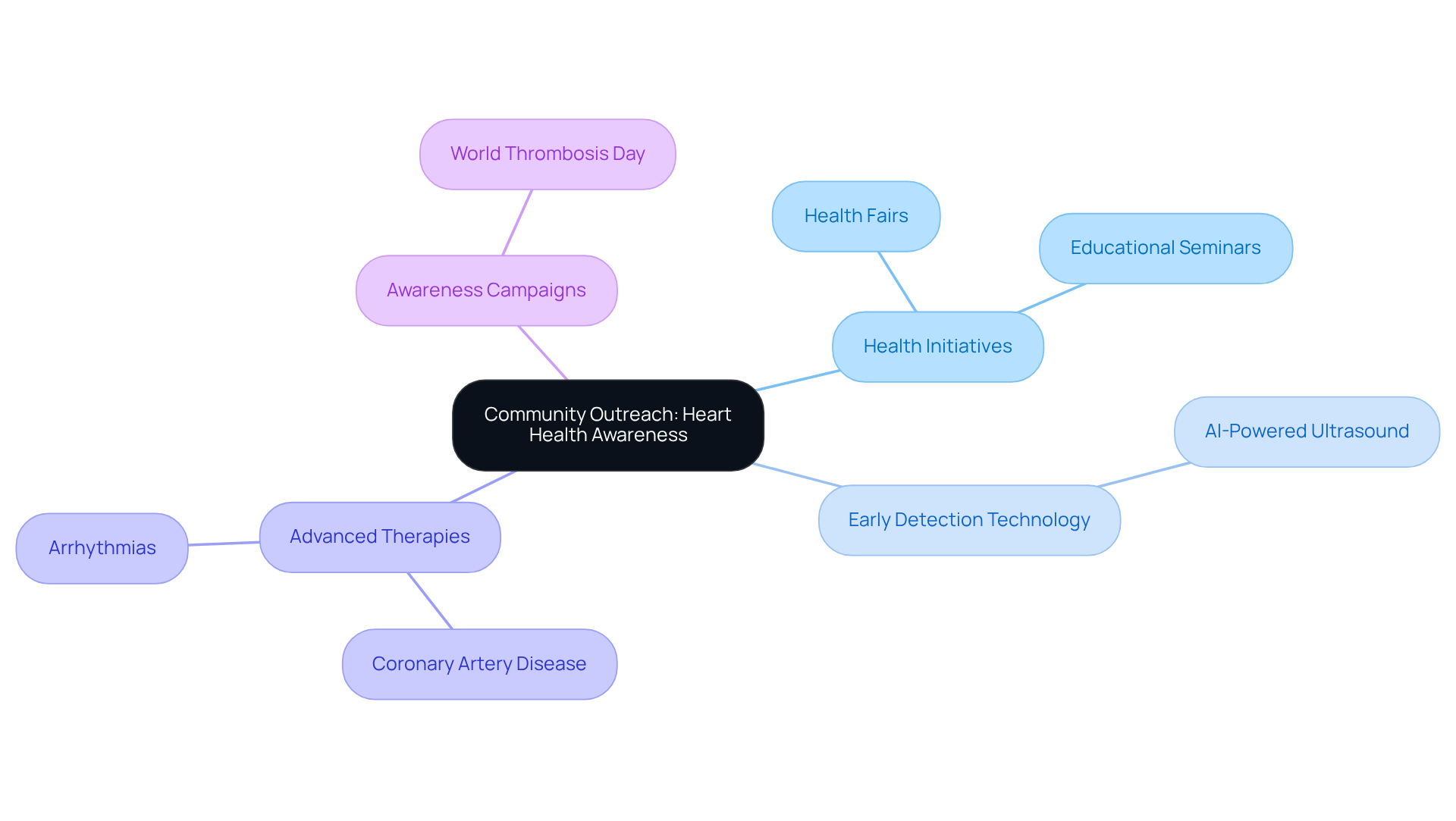
Amavita Heart and Vascular Health is here to provide you with comprehensive and effective treatments for blood clots, always prioritizing patient-centered care and innovative therapies. We understand that navigating health concerns can be daunting, which is why we highlight a range of treatment options. From anticoagulants and thrombolytics to mechanical thrombectomy and compression stockings, each plays a vital role in managing and preventing blood clots, ensuring your heart health remains a priority.
Have you ever wondered about the evolution of anticoagulant therapies? Or how thrombolytics can act swiftly in emergencies? Alongside these medical interventions, lifestyle modifications can significantly enhance your well-being. Regular monitoring and patient education are essential, empowering you to take charge of your health journey. Our commitment to community outreach underscores the importance of awareness and prevention in addressing the serious risks associated with blood clots.
In conclusion, the journey towards better vascular health is a collaborative effort. It involves advanced medical treatments, proactive lifestyle changes, and a supportive healthcare environment. We encourage you to seek guidance and utilize available resources to navigate your health effectively. By prioritizing education and awareness, we can work together as a community to reduce the incidence of blood clots and promote overall heart health. Remember, you are not alone in this journey; we are here to support you every step of the way.
What types of treatments does Amavita Heart and Vascular Health offer for blood clots?
Amavita Heart and Vascular Health offers a wide range of sophisticated therapies for blood clots, including state-of-the-art techniques for treating conditions like deep vein thrombosis (DVT) and pulmonary embolism (PE).
Who leads the team at Amavita Heart and Vascular Health?
The team is led by Dr. Pedro Martinez-Clark, who emphasizes a patient-centered approach combining medical excellence with compassionate support.
What advancements have been made in blood clot management?
Recent advancements include FDA-approved thrombectomy systems that have improved recovery rates and reduced complications associated with blood clot treatments.
What are anticoagulants, and how do they work?
Anticoagulants, commonly known as blood thinners, reduce the blood's ability to clot, helping to prevent existing clots from growing and lowering the risk of new clots forming.
What are some common anticoagulants used in treatment?
Common anticoagulants include warfarin, rivaroxaban, and apixaban, particularly for patients with atrial fibrillation or those recovering from certain surgeries.
Why is early treatment with anticoagulants important?
Starting anticoagulant treatment within four days of an ischemic stroke can reduce the risk of another stroke by nearly one-third, emphasizing the importance of early intervention.
What are thrombolytics, and when are they used?
Thrombolytics, or 'clot busters,' are used in emergencies to rapidly dissolve clots that can cause heart attacks or strokes, restoring blood flow and reducing long-term damage.
What are some examples of thrombolytics?
Notable thrombolytics include alteplase and tenecteplase, which are administered intravenously and have shown improved outcomes in acute myocardial infarction cases.
What is the concern regarding the use of thrombolytics?
While thrombolytics can be life-saving, they are closely monitored due to potential side effects, particularly bleeding, necessitating careful selection and monitoring of patients during treatment.
How can patients get support regarding their treatment options?
Patients are encouraged to reach out for support and guidance regarding their treatment options for blood clots, as resources are available to help navigate their health journey.